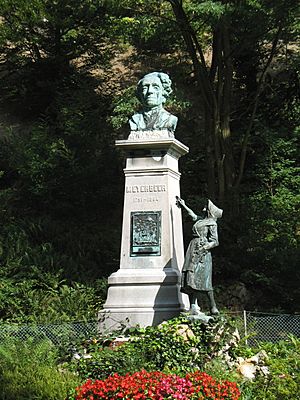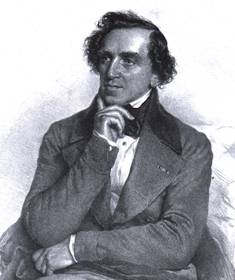Giacomo Meyerbeer facts for kids
Giacomo Meyerbeer was a very famous German-born opera composer. He was born near Berlin on September 5, 1791, and passed away in Paris on May 2, 1864. During the 1830s and 1840s, he was the most important composer of French Grand opera. Even though he was incredibly popular in his time, his music isn't performed as often today.
Contents
His Life Story
Growing Up

Meyerbeer was born into a very wealthy Jewish family in Tasdorf, near Berlin. His father owned large sugar factories in Berlin and Italy. His mother also came from a rich family. Her father was important in Germany's fight for freedom from the French in 1812, when Napoleon was trying to take over much of Europe. Giacomo's mother did a lot of good work helping people who were hurt during these wars.
Many famous people visited Giacomo's family home. Some visitors were from the royal court of Prussia, including the future King Friedrich Wilhelm IV. The famous naturalist and explorer Alexander von Humboldt also visited them often.
Giacomo's first piano teacher was Franz Lauska, who also taught the royal princes. Giacomo also took lessons in composition. He first played in public in 1801, performing Mozart's Piano Concerto in D Minor in Berlin. He wrote his first opera in 1810. That same year, he went to Darmstadt to study with the well-known music theorist Abbé Vogler. There, he met the young Carl Maria von Weber, who was also a student of Vogler.
Meyerbeer left Vogler in 1811 and tried to find work in Munich. In 1813, he was offered a job as court composer to the Grand Duke of Hessen. Vogler had probably suggested him for the job. At this time, Meyerbeer was better known as a pianist than as a composer. He traveled to London to hear a famous pianist named J.B.Cramer. In London, he met other well-known pianists like Kalkbrenner and Ferdinand Ries.
Time in Italy
In 1816, Meyerbeer went to Italy. He wanted to learn about Italian opera and collect Italian folksongs. He planned to stay only three months, but he ended up staying for most of the next nine years! During this time, he made some trips back to Germany and Austria. He composed several operas that became very popular. People even started to compare him to the famous Rossini.
However, in Germany, people weren't very interested in his music. He took his opera Il crociato in Egitto to London and then to Paris, where it was a big success. This opera is remembered today for being the last opera ever to have a part for a castrato singer. (A castrato was a male singer who had been castrated as a boy to keep his high singing voice.)
Meyerbeer was becoming quite famous now. Gaspare Spontini asked him to compose an opera for Berlin. In Paris, he became friends with the librettist (the person who writes the words for an opera) Eugène Scribe, who had a lot of influence in French theater.
The Grand Operas
From 1825 onwards, Meyerbeer spent his life traveling around Europe. He was often in Paris and Berlin but didn't live in either place. He stayed in hotels or private homes wherever he went. One reason he traveled was because of his health. His wife also had poor health, so they often went to spa towns to try to get better. He also traveled to watch his operas being performed and to hear young singers.
When Carl Maria von Weber died, he left an opera called Die drei Pintos unfinished. It was sent to Meyerbeer, hoping he would finish it, but he didn't seem interested. Eventually, Gustav Mahler finished it many years later.
Meyerbeer made changes to Il crociato in Egitto and turned it into a grand opera for the Opéra in Paris. He changed it from an Italian to a French opera, adding extra dance music and a new overture (the music played at the beginning). He was determined to become famous in Paris.
In 1826, he married his cousin. They had five children, and their three youngest daughters lived to adulthood.
In 1828, Daniel Auber, a famous French composer, created a very popular opera called La muette de Portici. This was the first French grand opera. Meyerbeer realized he couldn't become truly popular just by changing his Italian operas into French grand operas. So, he took his comic opera Robert le Diable and changed it into a grand opera. Audiences loved it! Within three years, it had been performed in 77 theaters in 10 different countries. Many composers even made their own versions of some of the tunes from the opera.
Meyerbeer received many honors: he became a Chevalier of the Legion d’honneur, was given the title of Prussian Hof Kapellmeister (Director of Music at the Royal Court), and became a member of the Prussian Academy of Arts and the French Institute.
Meyerbeer understood that anything else he wrote had to be truly excellent. In 1836, he produced another opera, Les Huguenots. This opera was also incredibly popular.
In 1842, he went to Boulogne to improve his health. There, he met Richard Wagner, who asked him for money to help stage his operas Rienzi and The Flying Dutchman. Meyerbeer lent him money but stopped when he heard that Wagner was secretly criticizing him.
Years in Berlin
When Gaspare Spontini died, Meyerbeer was made Generalmusikdirektor (General Music Director) in Berlin. His opera Les Huguenots had first been banned in Germany, but now it was allowed to be performed. As court composer, he wrote a grand opera called Ein Feldschlag in Schlesien (A Battle in Silesia), but it never became famous around the world. The main part in this opera was sung by the famous singer Jenny Lind.
Return to Paris
In 1849, Meyerbeer returned to Paris. He wrote several works with Scribe, whom Meyerbeer called the best living librettist and one of his closest friends. His opera Le prophète (for which Scribe again wrote the words) earned him a lot of money. The great contralto (a female singer with a very low voice) Pauline Viardot-Garcia sang the main part.
Scribe died in 1861. Meyerbeer worked very hard to finish his last opera, L’Africaine. Napoleon III said he wanted the opera ready by the winter of 1862-63, but it wasn't ready until 1864. The work was being rehearsed for its first performance when Meyerbeer suddenly died. He didn't get the chance to make final changes, which he usually did for most of his pieces.
Meyerbeer’s body was taken to Berlin, where he was buried in the Jewish cemetery in a family vault.
Meyerbeer’s Music Style
Meyerbeer was always more popular in France than in Germany. His operas often showed the lives of wealthy people. The sounds he created with his orchestra were sometimes intentionally strong or even harsh. In this way, he was similar to composers like Beethoven in his later years and Berlioz. Sometimes he used new instruments, such as the bass clarinet and the saxophone.
He always thought carefully about what his singers could do when writing his music. He enjoyed working with different singers, including Velluti, who was the last of the great operatic castrati. He took great care to give his singers breaks during the opera so they would still have strong voices for the most important parts of the story. He liked scenes with large crowds. He composed his dance music very carefully. Often, he would throw it away and start again if the dancers weren't happy with it.
Besides his operas, he also wrote orchestral pieces for special events. He also composed some songs to be performed in private gatherings called salons.
Meyerbeer was one of the richest men in Europe. This is why some people disliked him.
Meyerbeer’s Fame After His Death
Meyerbeer’s operas were extremely popular in the middle of the 19th century. However, by the end of the century, they were no longer as fashionable. From 1933 to 1945, his music was banned in Germany by the Nazis because he was Jewish. Today, there is some interest in his music again, but it's nothing like the huge popularity he had during his lifetime.
Images for kids
-
Heinrich Heine on his sickbed, 1851
See also
 In Spanish: Giacomo Meyerbeer para niños
In Spanish: Giacomo Meyerbeer para niños
 | Claudette Colvin |
 | Myrlie Evers-Williams |
 | Alberta Odell Jones |









